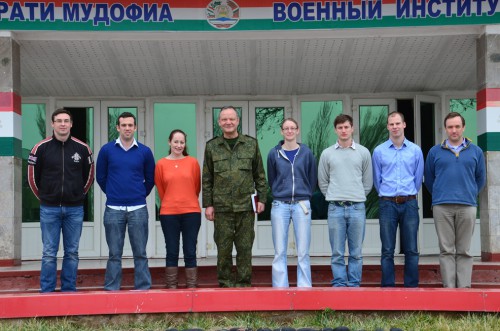4th February 2013 Dushanbe, Tajikistan
Learning Dari and Pashto in Tajikistan
Our Embassy often assists the British Defence School of Languages in arranging in-country Language and Cultural Training for students of Farsi and Pashto. The latest trip of three weeks included five students of Dari and two of Pashto. The following is a guest post by Fiona MacFarlane, one of the language students.
We arrived in the early hours of Monday morning after a long and hot flight wearing as many layers of clothing as feasibly possible due to forewarning that there were several feet of snow. We were not disappointed.
We were then introduced to our trusty driver, who has safely negotiated the incredible roads of Dushanbe. After a few hours sleep we were back in the vehicle and taken on a whistle stop tour of the city where the full scale of the Dushanbe driving experience was witnessed by all.

We were housed in apartments in Dushanbe city centre in small groups of two or three. Each apartment hosted a Farsi or Pashto speaker who would spend the evenings with us, with the main aim being to integrate into the language. Our time with them was spent talking about a variety of topics and sharing stories. We were taught how to cook traditional Afghan food and guided around the city and the bazaars.
Our daily routine generally consisted of breakfast with the native speakers before making our way to a local school where classes consisted of a mixture of their books and our own, with the assistance of a native speaker teacher.
The environment allowed us the opportunity to have general conversations with both the teachers and the very inquisitive children, which has increased our local vocabulary. After school lunch was eaten in a café, where we soon became known for pointing and gesticulating at food we had never seen and could only imagine what it was.
However we must have been doing something right as we are perhaps one of the first courses who haven’t been hit with some sort of illness. After lunch, our afternoon was spent in the Military Institute with a range of teachers who taught both Tajik history and assisted with our own studies.
On our free days we took the opportunity to see more of Dushanbe including the Opera Ballet, the parks, local monuments, cafés, restaurants and bars, the bazaars and a trip to watch Buzkashi. All of which were an experience; between the largest ever flag, to the smells and sights of the bazaar, to purchasing traditional clothing, and a few near death experiences at the Buzkashi – which, along with the Dushanbe roads, it seems everyone else appears to know the rules of, apart from us.
The opportunity to carry out in country language and cultural training has been invaluable. It has assisted in fluency, and increased our listening ability. Colloquial words and phrases will no doubt be of great help when carrying out our future roles and living in country. Communicating and being understood has really increased our confidence in using the language.
Dear Sir or Madame,
I’m half Afghan and half English and would love to go to a country like Tajikistan in order to learn my actual mother tongue.
Could you please help me find if what you offer might be the right choice?
Thank you in advance.
Yours faithfully
Shabon Jones
Dear Robin Ord-Smith, congratulations for releasing this “Guest Blog” by language student Mrs. Fiona Mac Farlane. And my full and honest respect for her- for I do know that it ´s not so easy to write as a “Guest”. 2009, former British Ambassador Sir David Warren(Tokyo/Japan) allowed me to do also so.It was “quite good” but no-one is telling you that the hardest time starts after it ´s released.(Am I good enough? Will there be any kind of feedback at all?plus unfortunately I ´d never had a 2 nd. chance. So that I could compare it. ) So far so good but Mrs. Mac Farlane is the “Star” and her topic is about learning Dari and Pashto in Tajikistan.To me : She wrote some parts very sensitive, very proper and important for me with this typically British sense of houmor. Just great ! (“….long, hot flight….wearing as many layers of clothing as…” or this “…trusty driver with the full scale of Dushanbè `s driving experience…”)So it ´s just marvy to read of how they have learned to cook “Traditional Afghan Food”. In other words : As a free- lancing teacher for disabled adults or/and traumatised pupils I do know of how important common cooking and eating is. By the way: It ´s a great thing of Mrs. Farfane and her study – group to visit local schools for it always leads to eye-to-eye situations/contacts. Theses are always building up tolerance, trust and respect. It would only be interesting for me to know wheather these classes were mixed, girls and boys, or seperated.
Best wishes , Respekt, Hawyl Faur, Ingo-Steven Wais , Stuttgart/Wuerttemberg, Caerdydd/Cymru.